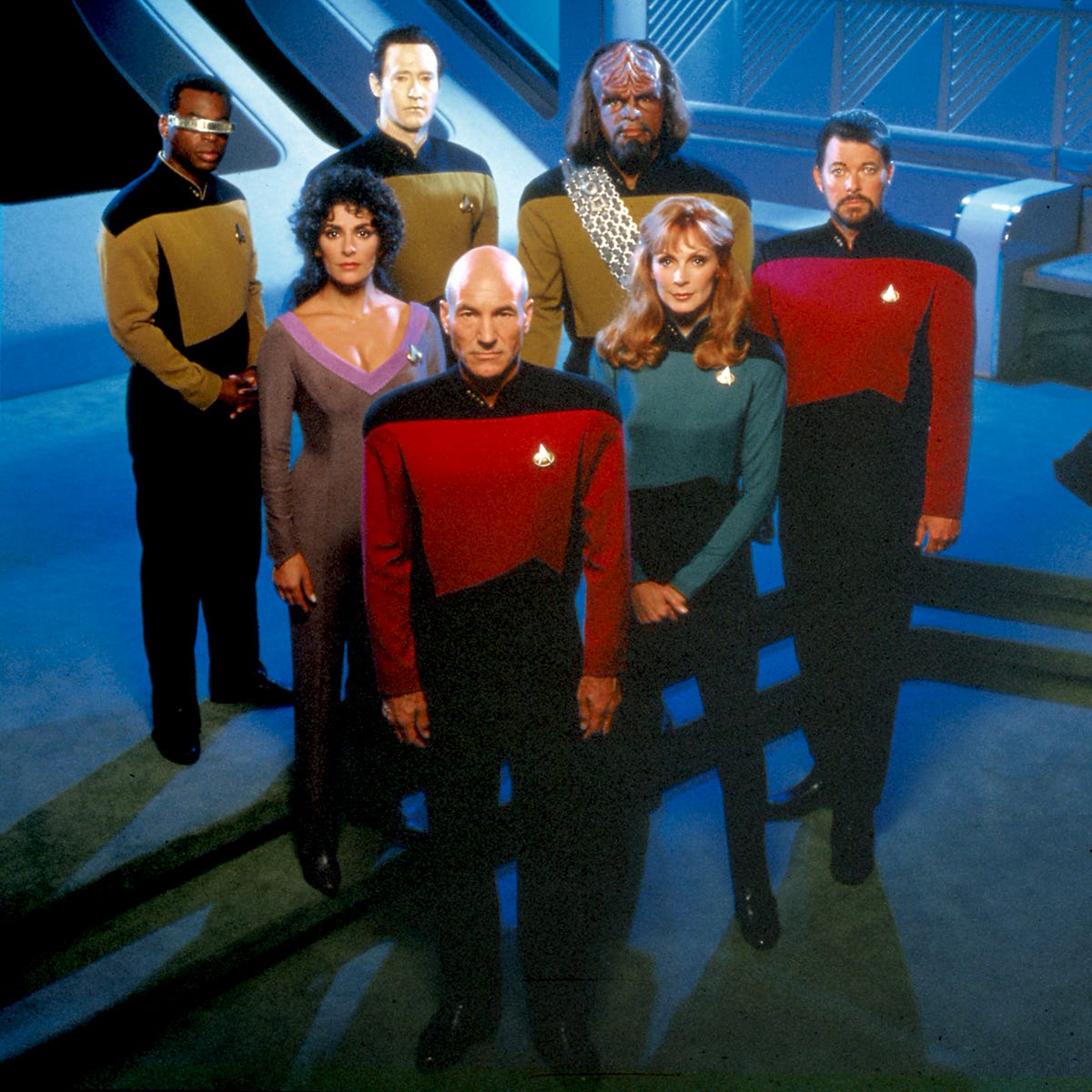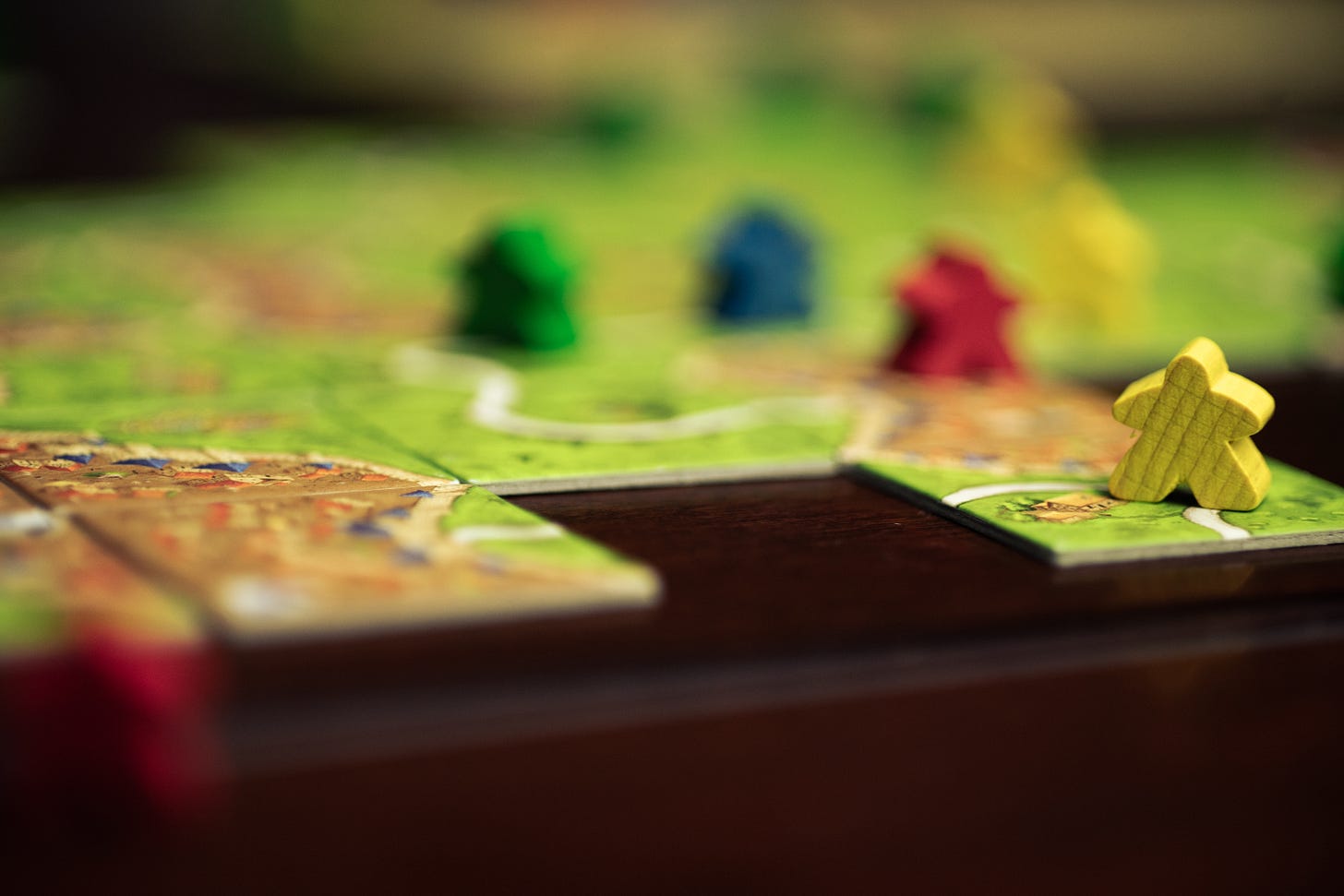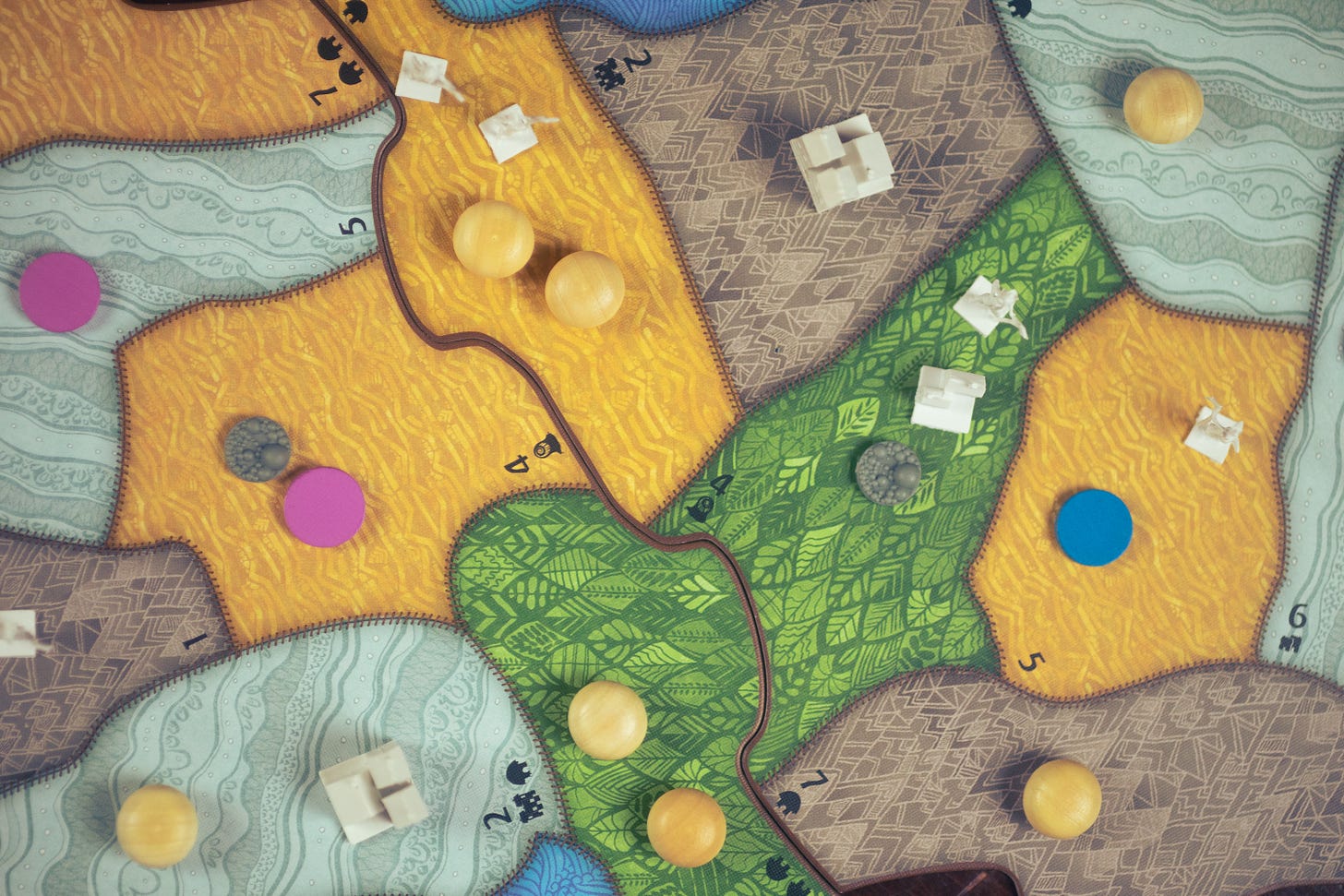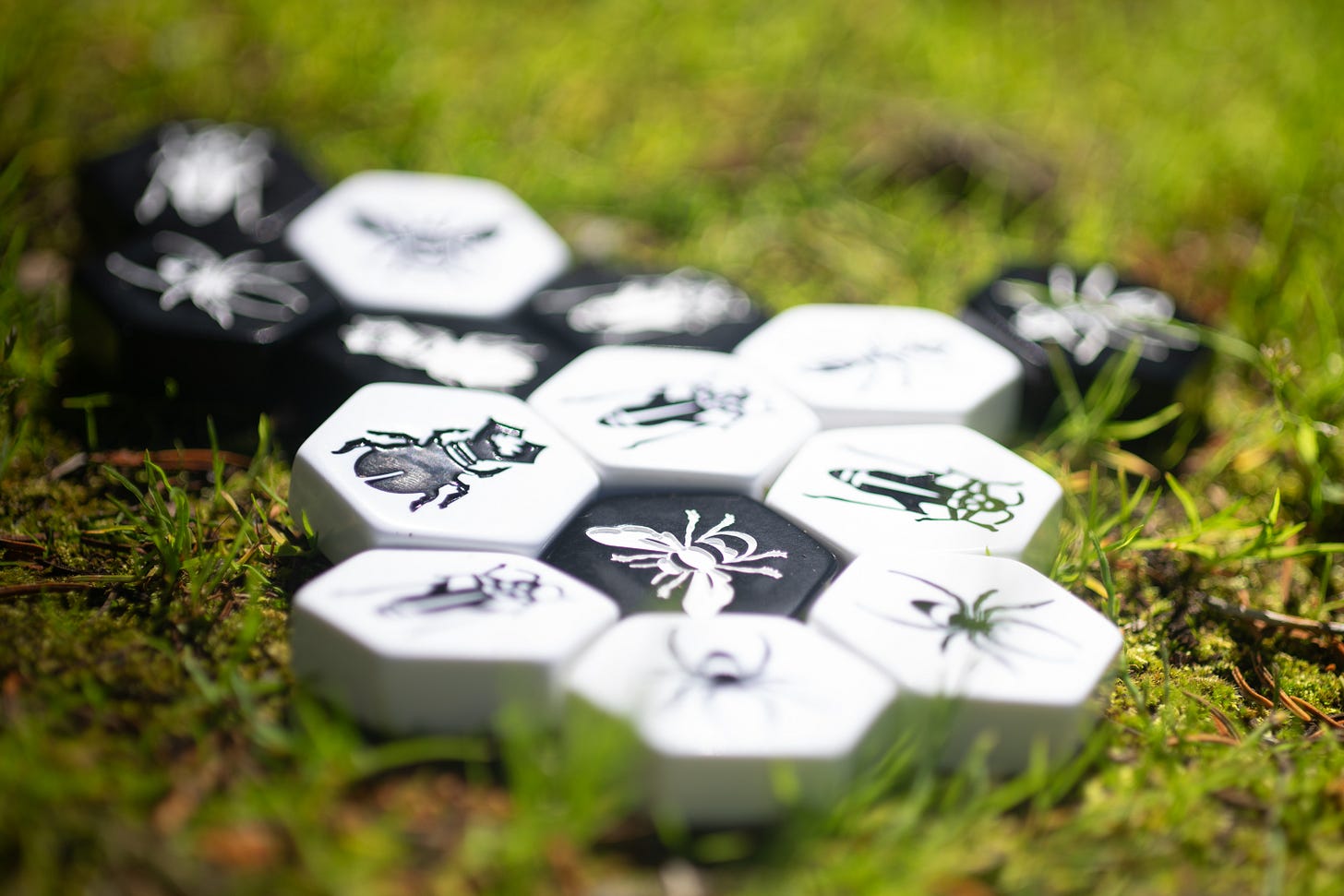Game night on the USS Enterprise
What would the senior staff of the NCC-1701-D bring to game night?
My original thought here was to give this the utterly unreadable headline of “10 board games the crew of the U.S.S. Enterprise should have played instead of the game from The Game,” but for a number of reasons, I’ve listened to my own better judgment. But that’s sort of the premise of this week’s newsletter: These are games the crew of the ship should have played instead of the mysterious, addictive disc-into-cone game featured in the season five episode “The Game” of Star Trek: The Next Generation.
Some background on the game — and the episode — in question: Commander William Riker, on shore leave on the planet Risa, is introduced to a brain-connecting game by a character during an (uh) romantic tryst. The goal of the game is to move a disc in a three-dimensional environment into the cone. When you pass a level, you’re rewarded with a pleasurable physical sensation. The crew of the ship very quickly becomes addicted to this game, which has expressly been designed with that purpose. (This episode features Ashley Judd in her second television role, with her first being another classic episode of the same series, “Darmok.” Neat!)
It’s a classic episode, but I’ve got to say: This is a game that requires some physical manipulation of the subject to really work. There are some great board games that could spread across the ship like wildfire without any ill effect.
Captain Jean-Luc Picard
The good captain of the starship Enterprise is a Frenchman with an English accent. After retiring from Starfleet, he opens a vineyard in La Barre, France. Chateau Picard captures his post-service attention so acutely that we might be tempted to give him a game about wine-making.
Vinhos, a heavy strategy game from Vital Lacerda about wine-making, comes to mind, but no — Picard is brilliant, but his tilt toward the simple life gives us pause here. Viticulture, a worker placement game about running a vineyard from Jamey Stegmaier, still feels a bit too heavy. Jean-Luc has settled down, and he would prefer a simple game to play with the Romulans working at the vineyard and his friends that come to visit.
Carcassonne is Picard’s choice for game night. It’s perhaps a bit too obvious, picking a game about the French countryside for the Frenchman living in the French countryside. But it’s a good eight-hour drive from La Barre to Carcassonne, so it’s not like he’s playing a game about being in his own backyard. The simplicity of grabbing a tile and placing a tile would be appealing, but there’s strategy and depth here for Picard to explore. An aggressive move in a game against Laris is absolutely understandable, but perhaps he would most frequently focus on completing his own features.
Commander William Riker
The ship’s first officer, Will Riker, loves old Earth traditions. He plays poker with the senior staff, plays old Earth standards on the trombone, and even attempts to make scrambled eggs in the season 2 episode “Time Squared.” (Let’s ignore that Dr. Pulaski says he’s making an omelet. It’s not.) This is a man who loves the simpler things in life, and it is not a stretch to see the Alaska-born commander playing a trick-taking game. I don’t think he’d go for anything too esoteric — although in the world of replicators in a post-scarcity society, does it matter if a game was published in 2024 in Japan? — but instead opt for something that’s stood the test of time.
I can easily see Commander Riker picking up a game like Seas of Strife on a visit to a starbase. “Replicated cards,” he’d say, “don’t have the same unique feel of a card made in the 21st century. They’re all too uniform.” But Seas of Strife, as good as it is, isn’t quite it for Number One.
No, Riker’s got to be into the classics. He’s probably playing Hearts when the moment arises. Sure, there’s not too much bluffing — he has those poker games to hold him over — but there’s a certain cleverness with play that will keep him satisfied.
Commander Beverly Crusher
The ship’s chief medical officer, Dr. Beverly Crusher, is well-versed in the ways of recreation. Her dancing ability is renowned. She plays tennis. She writes, produces, directs and acts in live theater. The good doctor is a woman of many talents and interests. She may not be into heavy board games, but her presence at poker nights gives us reason to suspect she’s not immune to the pull of a game night either.
Dr. Crusher almost certainly has a few games she loves, and I suspect she’s bringing Wavelength to game night. It’s a team-based party game in which one member of a team is trying to come up with a clue that guides players to the right spot on a spectrum. I can just see her introducing the senior staff to the game. Captain Picard would look concerned. Worf would grumble but have a good time. Data would be puzzled at every answer. The scene practically writes itself.
Commander Deanna Troi
The first game that comes to mind for the ship’s counselor is (uh, sorry about that pun) The Mind. It’s a cooperative game about playing numbers in order cooperatively and without talking. I thought for a bit it might be cheating, but let us remember that Counselor Troi, being half-Betazoid, half-human, doesn’t have fully telepathic capabilities (unless communicating with other Betazoids, apparently.) She’s instead empathic, and she’d thus just pick up everyone’s collective nervousness. A hack for winning the game? Certainly not, though it could help.
That’s a simplistic choice, though. Commander Troi (lest we forget, she is a line officer and part of the command rotation by the time the series ends) is concerned chiefly with the mental and emotional wellbeing of the crew. She’d probably propose a game that encouraged cooperation, discussion, and the bringing of the crew together. We’re looking for something cooperative, then, and something that’s generally accessible to a lot of the crew. Of course, this is a Starfleet vessel, and we can assume a certain level of competence at understanding rules.
So, it’s decided. Deanna Troi would be playing Spirit Island, a cooperative game for up to six players (with expansions). It does verge on the complicated, but the entire premise of the game is about using one’s own skills to coordinate in problem solving. Each player takes on the role of a supernatural power trying to ward off colonizing invaders; the abilities of those powers have a wide range of interactions and complexity. It’s a really great game.
Lieutenant Commander Data
Our favorite android would beat his fellow crew members in every single game he played if we stuck to games that were purely deterministic. But Data, in his quest to be more human, is bringing games he’s not particularly capable at. He’s always playing poker with the senior staff, but his ability to perceive a bluff has long hampered his success at the game. For Data, that’s perhaps the point of playing a game. It’s a way for him — and all of us, if I had to argue — to partake in part of the uniqueness of humanity. Organized play is a powerful reminder that we are not purely mechanistic, nor are we purely animalistic.
Data’s pick for game night is Can’t Stop, which is a simple push-your-luck game. He will immediately know every statistical outcome of every roll of the dice. He will stop when the odds indicate he should stop. He will continue when the odds say he should continue. He will not understand the spirit of the game, but he will observe his fellow crew members continuing despite the odds, over and over. Curious.
Lieutenant Commander Geordi LaForge
Here we go. If anybody’s into heavy games, it’s one Geordi LaForge, whose career in engineering has him managing the most involved, intricate parts of the ship. The chief engineer wouldn’t hesitate to pick up a Vital Lacerda game, an 18xx game, or the most involved wargame. Of course, he’ll need fellow members of the crew with which to play the game — it’s not the same, a holodeck opponent. Oh, I mean, he’s tried that. He’s even solved some difficult problems doing that. But it’s not the same.
Despite his ability to understand complex rulesets, I truly think Geordi is looking for games he can play with others. Like most people, he desires a connection with the people around him. There’s a reason he’s at those poker games. He really is gaming for the people. That’s why Geordi is always playing mid-weight games and loving it, even though he wishes he could get a heavy-gaming group together. The demands of being a chief engineer on board the flagship are prohibitive.
That’s why Geordi’s really settled in on Agricola as a game he takes to game night. It’s a classic of its kind, with the worker placement really exemplifying the genre. Uwe Rosenberg’s prolific catalog has plenty for Geordi, but we all know he loves something well-constructed and thoroughly considered. You can’t go wrong with Agricola. Unless you forget to feed your family.
Lieutenant Commander Worf
You’d think that our Klingon tactical officer, Worf, would be playing a game that tested his mental and physical acuity. His intensity is well-known. However, his gaming ability, at least at poker, leaves much to be desired. The number of times he’s looked at his cards and simply folded? It’s just not a recipe for competitive card games. Sure, he might join Commander Riker in games of Hearts, but that’s not the game for Worf. And sure, he might tell Dr. Julian Bashir when he first arrives on Deep Space Nine that he “(does) not play games.” But we all know that’s not the real Worf.
Certainly, Worf won’t be playing The Fuzzies, with its little miniature tribbles reminding him too much of a great enemy of his people. I think he could get behind some dexterity in his game, and I think there’s a certain lightness about Worf that isn’t always obvious. Still, Worf won’t be straying too far from his instincts. He’ll be playing a tactical game.
Hive is my pick for the commander, and not just because he (probably) wouldn’t accidentally crush the pieces in anger while playing. Hive is a fantastic two-player tactical experience. Your goal is simple: surround your opponent’s queen bee. Your pieces have different abilities, which allows you to move them in various ways around a hexagonal grid of indeterminate size. Hive is a warrior’s game.
Ensign Wesley Crusher
In what feels a bit like reality-meets-fiction, Ensign Wesley Crusher is absolutely into board games of all kinds. (The actor portraying Wesley, Wil Wheaton, is famously a big fan of board games, himself.) He loves being clever, exploring the world around him, and trying new things. Most importantly, he’s playing games that connect him with the people around him: While the boy genius is without peer, he’s always seeking meaningful connections. If he and Ensign Robin Lefler hadn’t been busy saving the Enterprise from the titular game in “The Game,” maybe they would have been playing a board game together in Ten Forward. (A tangent: Ten Forward must have the best game nights.)
While Wesley might have a bit of a problem quarterbacking in this one, Pandemic and its many variants is his pick for game night. The Matt Leacock-designed classic is clever, intuitive and can increase in difficulty. It’s a way for Wesley to work on letting others solve problems in a safe environment. Most importantly, the game is fun, and he might even go through a campaign or two of Pandemic Legacy, should he find the right group. (And certainly, we hope he finds the right group. We wouldn’t want him to fall in with a bad crowd, lie to his former captain, and nearly get kicked out of the academy.)













Fun, fun read! Excellent choices.
No, it made perfect sense to this Trekkie. :)